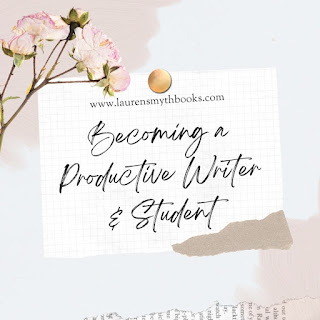Becoming a Productive Writer & Student
I'm a full-time college student, majoring in economics and minoring in journalism. I have a part-time job as a marketing writer. I also write and publish books, articles, short stories - you name it. I participate in extracurriculars (playing tennis, attending economics events, etc.). I have two radio shows, and I do weekly news and weather reports. Here's the best part: I also have a social life, and I get eight hours of sleep. What could be better?
Despite what sounds on paper like a productive college experience, I often struggle with feeling that I'm not productive enough. Every student doubtless asks themselves the same question: Could I do more? Probably, yes. But here's the question we often forget to ask: Should I do more?
Before swearing off laziness and undertaking the holy vows of productivity, ask yourself this question. Are you already doing enough? Do you really have time to add more, or should you make substitutions instead? For example, last semester I was involved in an extracurricular I didn't enjoy. This semester, rather than adding another extracurricular, I simply swapped the old one for a new one. I also dropped a class and replaced it with - horror of productivity horrors - absolutely nothing. Being "more productive" doesn't necessarily mean "adding in new things." It might simply mean decluttering the old commitments to make room for new ones - or to make room for down time.
While you're thinking about that, let's take a look at my typical Tuesday schedule. It's a light class day, which means my time is my own, which means I'd better find something good to do with it. Let's suppose that Wednesday is an exam day (I have a lot of Wednesday exams), so there's also a review session scheduled, and there's a lot of prep to be done.
2:30-3:45 PM - Class
5:00-6:30 - Economics Review Session
7:00-8:00 PM - Class
11:00 - Sleep
That's it for organized activities. There are huge chunks of free time throughout this day, which is both a blessing and a danger. Distraction could rear its ugly head, and I could get nothing done. On the plus side, I have time to get a lot done. Here's what my schedule might look like after I get everything filled in:
7:00-9:00 - Wake up, quiet time, breakfast, get dressed, morning routine, light workout
9:00-12:00 - Study (35 minutes on, 5 minutes off)
12:00 - 12:30 - Lunch
12:30-2:00 - Study (35 minutes on, 5 minutes off)
2:00-2:30 - Hang out with friends before class
2:30-3:45 - Class
3:45-4:00 - Find a spot in the library. Say hello to that one friend who's always there.
4:00-5:00 - Study (25 minutes on, 5 minutes off)
5:00-6:30 - Economics Review Session
6:60-7:00 - Dinner
7:00-8:00 - Class
8:00-9:00 - Write (One hour straight, no breaks)
9:00 - 11:00 - Debrief the day with roommate, beat roommate at a card game, shower, read, set out clothes/books for next day
11:00 - Sleep
Here's how that breaks down:
Class time: 3 hours 45 minutes
Study time (including breaks): 5 hours 30 minutes
Writing time: 1 hour
Free time: 5 hours
Sleep time: 8 hours
You might notice this doesn't add to 24. That's because there are built-in breaks here and there, which I haven't included in the run-down because you'll need them to walk between classes, grab a coffee, chat with friends, etc.
Great, you'll say. That would be a neat-o schedule if only I could stay focused for 5.5 hours of studying and if I knew what I was doing at what times.
Here are some tips for getting - or staying - on track.
1. Don't drink caffeine within six hours of bedtime. Depending on how sensitive you are to caffeine, you may want to drink tea (light caffeine) or coffee (medium caffeine) or even espresso (heavy caffeine) in the morning. But keep in mind that caffeine has a long half-life in the human body, and it will continue affecting you throughout the day. If you want to sleep well and avoid disturbing dreams, don't drink caffeine within six hours of bedtime. That means no caffeine for me after 5:00 PM - although I err on the safe side and halt the coffee by noon.
2. Don't try to study for more than 35 minutes straight. Trust me on this: You won't stay focused. Divide up your studying blocks with a five-minute break, which you can spend doing jumping jacks, watching YouTube study videos, or grabbing books for your next subject.
3. Track time wisely; make productivity, not time spent, the focus. You've already seen that I divide up my day in terms of hours spent doing each activity. I also use a study timer. This is so I don't accidentally start consistently studying for only one hour per day, at which point I'd know for sure I wasn't being as productive as I could be. It's also to make sure I don't study for eight hours straight and wear myself out. In the end, however, it's not about how much time you spend studying; it's about how much you get done. If you have an assignment due the next day, and you've worked on it for four hours, you don't just get to stop because your study timer bar is full. You have to keep going until the project is done. Conversely, if you have nothing due, put your books away and go hang out with friends. Don't force yourself to work on a project that doesn't exist.
4. Prepare yourself for the next day the night before. I have a daily planning pad on which I write all specific activities that need doing, all scheduled activities/times/locations, and major priorities if there are any. Looking over your schedule the night before will help you be on time in the morning. It will also prevent you from wasting valuable morning free time trying to figure out what you need to get done that day. The same principle applies to organizing books for school, charging your laptop/headphones, and picking a cute outfit. Speaking of which ...
5. Dress for what you want to accomplish. Frankly, this doesn't mean dress well. I've spent countless hours in the library over finals week dressed in jeans and the same very specific mushroom sweatshirt that I consider my "lucky test shirt." What it does mean is that if you intend to hole up in the library, dress comfortably. Don't bother with high heels and a miniskirt. If you're going to take an exam, dress nicely to hype yourself up. (Science says that if you dress well for interviews/exams, you often perform well too.) Depending on where you live, dress in layers so you won't roast in class and freeze outside.
6. Drink water and eat food. It's the basics, folks. Newsflash: You'll die if you don't do this, and you'll get sick if you don't do this well. I know what foods make me feel good, and which foods make me feel bad. I consciously choose to eat what makes me feel good. If that's spinach, and if that means I have to spend a bit more time preparing meals, it's worth it. I also drink water (or, let's face it, matcha lattes) during my study sessions so I can stay hydrated. Science also says that if you're hydrated, you perform better than if you let yourself go parched.
7. Take a Sabbath. The French Revolutionists tried to rewrite the calendar so that people worked nine days and took the tenth off. It failed, predictably. Humans are hard-wired to work six days and take the seventh off. Do this, and do it right. On the seventh day, block your phone notifications, shelve your textbooks, find your friends, go to the farmer's market, go to church, have an enormous dinner. A sabbath can be half a day (although, ideally, it should be a whole day). Take your rest. You've earned it, and you need it.
8. Don't skimp on sleep. If you're considering sacrificing an hour of sleep for an hour of studying, put on your economist cap and ask yourself: Is the benefit worth the cost? If it is, go ahead. But usually, sleep is more important, and more beneficial, than late-night study. There's one thing you can do to prevent having to skimp on sleep, which is ...
9. Start large projects or midterm studying at least one week in advance. By "large project," I mean a writing assignment of more than four pages OR a problem set that will take more than four hours. By "midterm," I mean an exam that is worth more than 15% of your grade. Whatever you do, don't start these last-minute. I typically set a reminder in my Google Calendar two weeks out, one week out, and the day of.
10. Know what you're doing at all times. Are you scrolling through Instagram? Know it. Are you reading this blog post? Know it. Don't look up in an hour and realize that you've gone down a Wikipedia rabbit hole, unless that was what you meant to be doing. Be intentional with every moment, and enjoy every moment. Relish the fact that you're doing something good and useful, and that means you'll get time to lie around or work on other projects later.
In the end, consistency is key. If you can make a schedule and hold yourself to it for just one week, you'll be one step closer to achieving your workload goals. Choose clear, specific tasks with obvious starts and ends, and use your time to knock them out of the park.
Remember: You can be a full-time student and a successful writer and a successful socialite with friends, dates, and a life (and a sleep schedule!).



Comments
Post a Comment